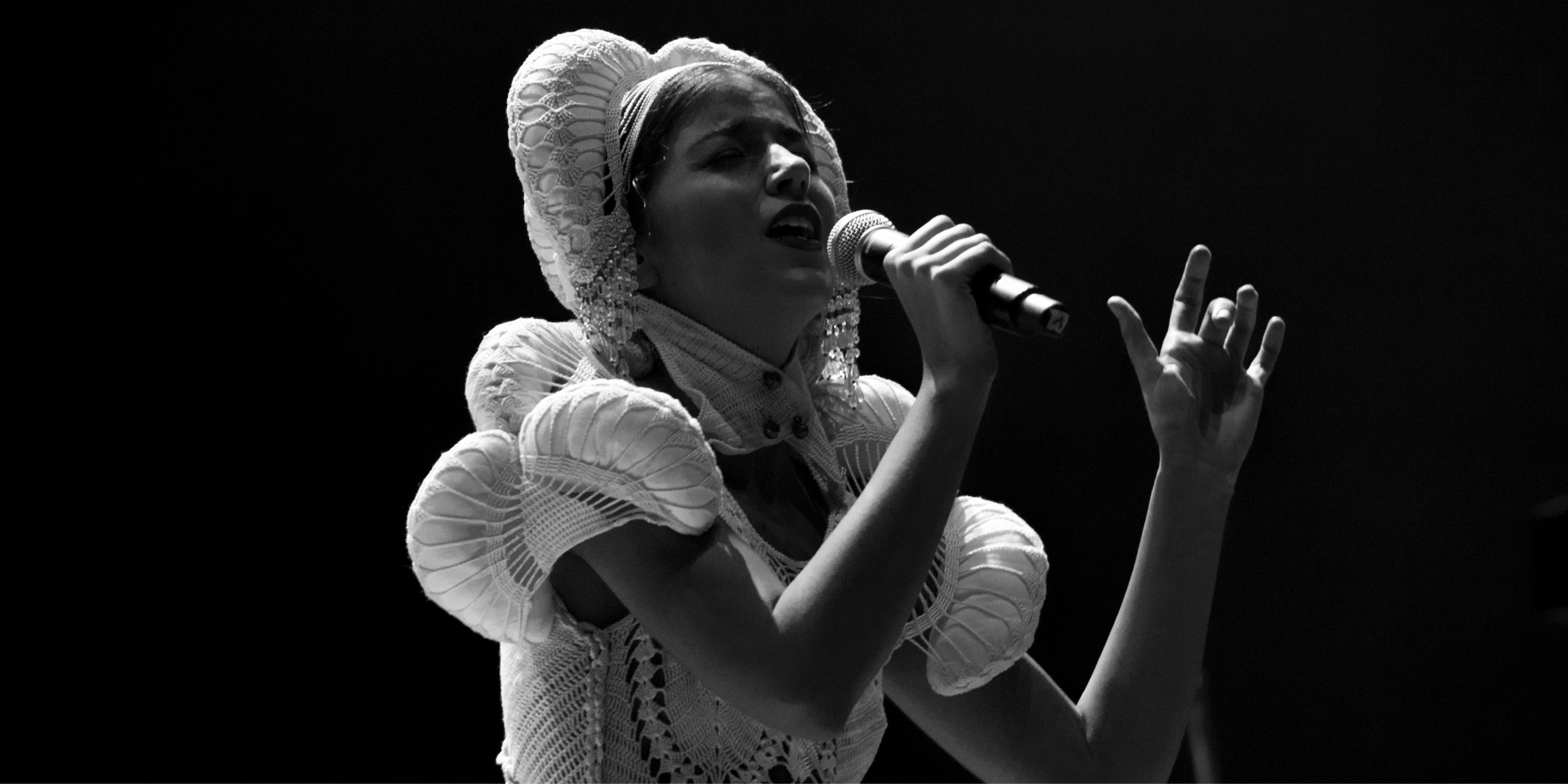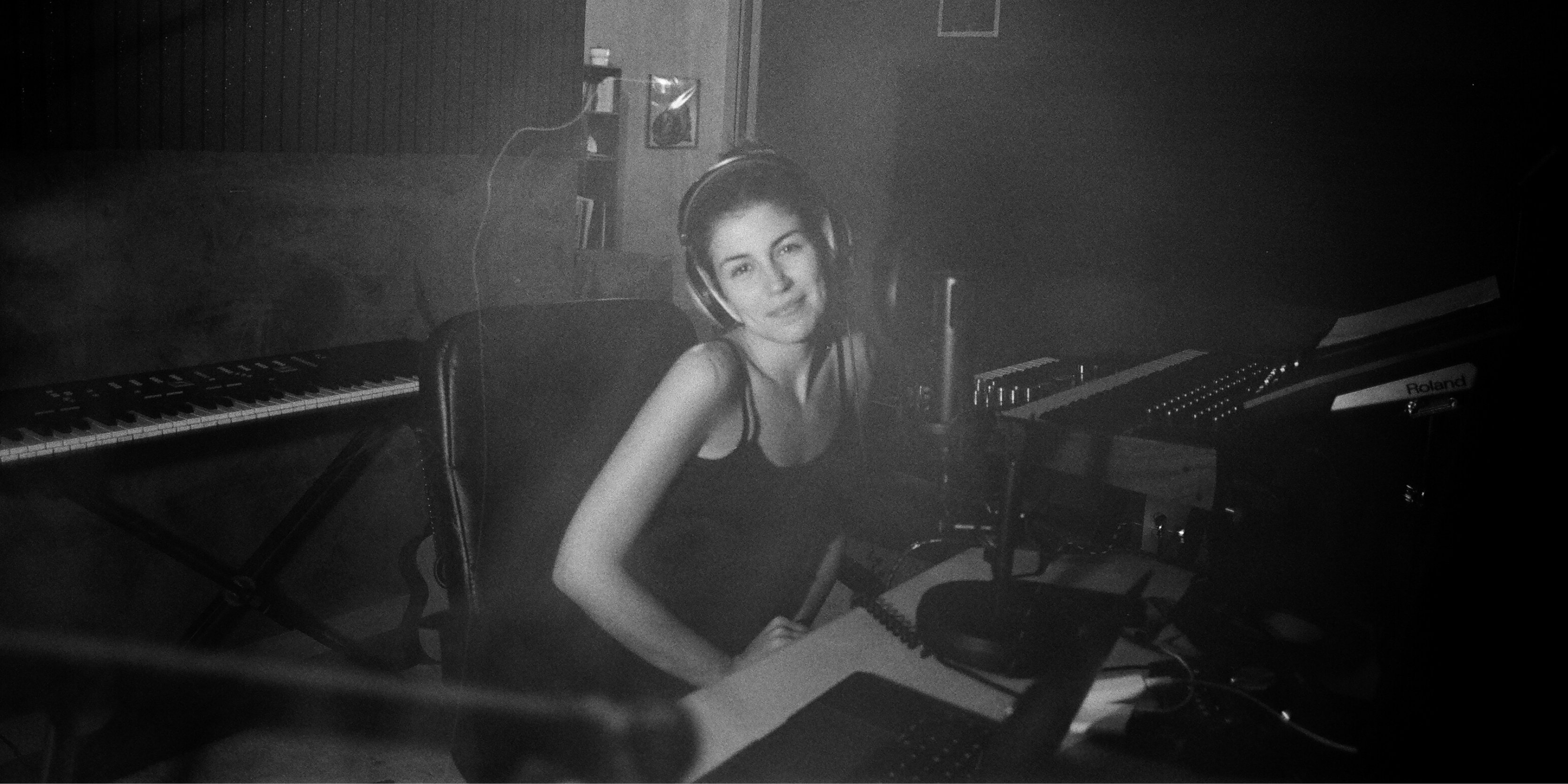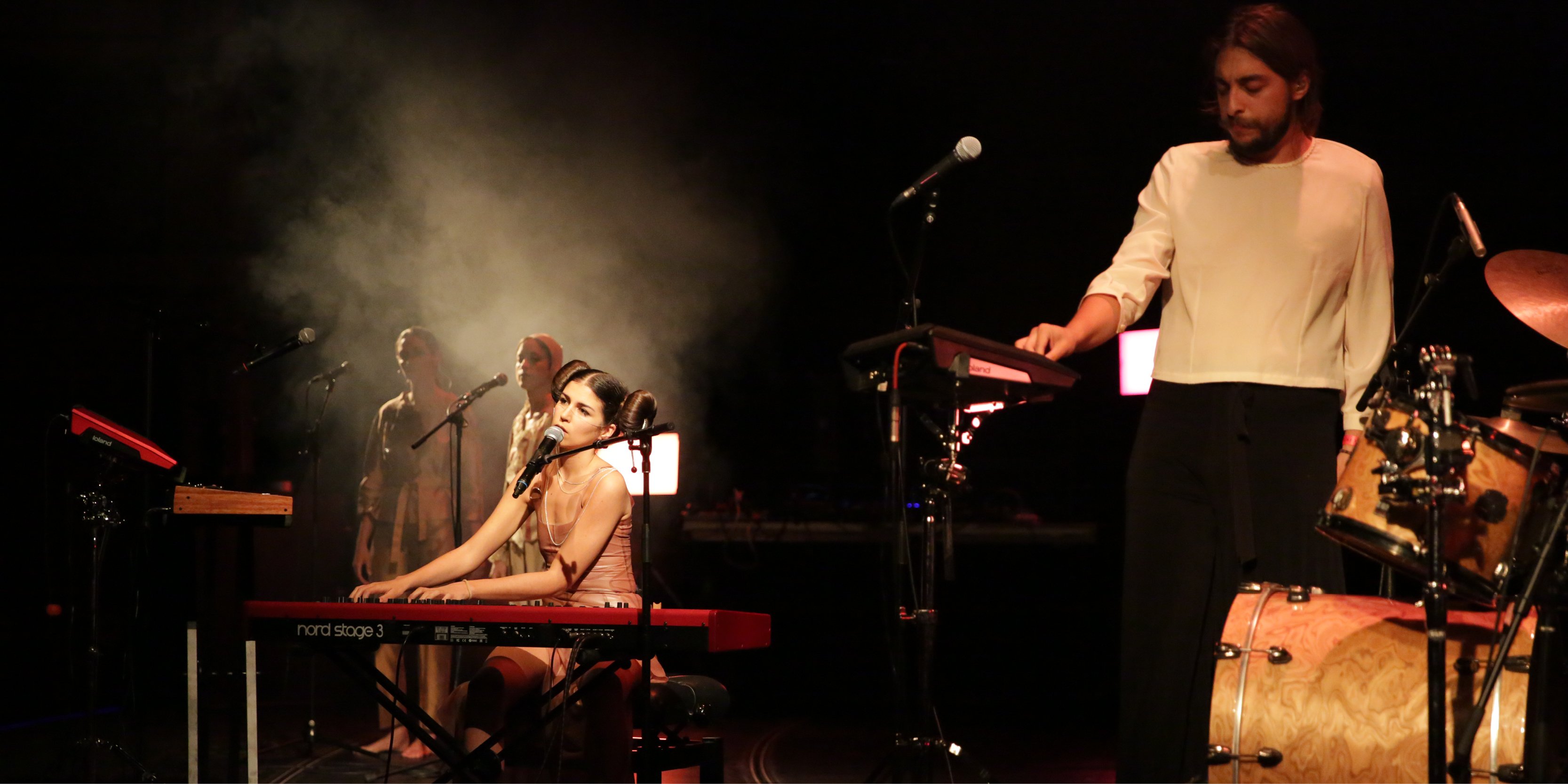Marina Herlop: Voice and Piano Extended To Infinity

Marina Herlop is on a path of discovering the infinite possibilities that extend out from a foundation of piano and vocals. On her most recent album, Pripyat, the classically trained Catalan composer chops and layers her voice many times over, filling out her compositions with elaborate harmonies and spiky electronics, exploring how far she can go with new tools and a broad imagination.
Tracks like “Miu” loop multiple vocal harmonies, creating a shimmering lattice of melodies that grows to encompass a stately chord progression and skittery percussion. But the evolution of Herlop’s sound world only entered its exploratory phase relatively recently. Much of her prior work featured solely voice and piano with minimal electronic manipulation. However, when she began recording Pripyat, she sensed that these instruments were no longer enough to make her compositional ideas a reality. So, having explored Ableton Live a little during the making of her previous albums, she now began using the software with a new intentionality and “a new portal opened,” she says over Zoom. “It was infinite multiplied by infinity.”
Electronics have now become a core part of her practice, allowing her to extend her classical voice and piano works into new registers. But Herlop never thought she’d work with software on her own. “I always had this misconception that it was something very, very complex. And that only some people with magic powers could do it,” she says. But while recording her second album Babasha, she began getting more comfortable with the DAW, initially by playing in parts directly via a MIDI keyboard or importing scores she’d written in notation programs. From there, cutting, pasting and arranging MIDI tracks in Live allowed Herlop to grasp more complex processes from mistakes she would make along the way (and calling her friends when she got lost). “You learn a lot, because it's much more effective than if you read it in a book, because it goes through experience and through emotion and then memories,” she says.
Finding beauty in the mistakes has led Herlop down the path she’s on now, but embarking on a path beyond the bounds of her classical education has not been without its hurdles. Her training taught her to pay close attention to every detail of composition and performance, critiquing every note and moment until she felt it was perfect. This led her to at times become terribly anxious when taking the stage; and only after years of performing vocals did she learn how to let go of those fears a little bit. “When you do it many times, it’s not sacred anymore,” she says, and overcoming those fears “actually helps you to overcome other stuff in your life, not just the music stuff. It makes you a better person.”
We talked with Herlop while she was in Bristol, UK straight off a gig in New York, where she improvised with people she’d never met before. That was a first for her – another in a series of musical adventures she’s undertaken as she embraces new methods of music-making. We caught up with her just as she’s in the studio recording new music that will explore even more new timbres and textures, and she seems energized by the wealth of possibilities ahead, ready to follow the path wherever it may lead.
How do you get started when you're working on a new piece?
I'm trying to figure it out. I'm starting a new album, and this is the most scary moment because it's the blank page. And what I'm starting to do is some pre-production, for example, I imagine the sonority. I want to give special attention to high frequencies and not use a lot of bass, or be very aware of when I'm using it. I try to put some limitations, because limitations help a lot. Maybe I don't follow them, but having them is very useful. Before starting to make music, I for example study some harmony, and then do some harmony exercises – when you're doing something else, then you come up with ideas because you're in a fresh state of mind. And so you might get ideas that you end up using for your music. I want to do stuff casually, and then find some stuff that I'm interested in. And from that, I want to start building something.
So when you're composing, what comes first – voice or instruments?
It depends on the song. Usually instruments, but that might change. What I do a lot of times is I go to the piano and I find some harmonies there. Because the piano is my instrument – when I hear piano, I don't hear a piano, it’s as if I was hearing the music itself. So, if they sound good on the piano, you can try to transport that to another synth or texture or anything. And then it has more personality. But, I might find some interesting chords and then record them on vocals, too. It depends.

Marina Herlop in the studio
What's your studio setup like these days?
I have my audio interface. I have my synth, a Prophet – I was using it quite a lot in the last songs I made. And then I have some plug-ins. I use Omnisphere and I have some Kontakt libraries. I have my monitors and I have an old piano in case I want to record something on the piano. It's very simple. It's very humble. I don't have to have a lot of stuff.
How do you transfer that to a live performance situation?
What I use in the live set is basically a computer, but most of the stuff I do onstage is performing instruments. I'm very busy playing the piano or playing the synth or singing, so I don't do much with the computer on stage. I basically use it to change the preset of the synths that is playing and to play the backup track, but I actually have to learn how to do stuff live on stage because I think that would open a new possibility.
Are your live performances aimed at accurately reproducing the album recordings or is there any improvisation involved?
My intention is to build a piece of work and then to play it as faithfully as possible in the live show. This is my personal feeling, but if I have to not play some of the parts or some of the instruments or to change stuff, it feels like I'm not being faithful to the original work. It takes so long for me to decide what instruments are going to be played and so if we subtract some of it, it feels like something's missing.
So my intention is to reproduce what’s on the album. But of course, since it's played by humans, every time in a different venue, under different acoustic conditions and so on, it's never exactly like the album. And even though I'm not looking for that, I like this difference between the album and the live show because it might be something very slight, but it's that something that gives it a living component. It's interesting that even if you want to reproduce exactly what you have in your mind or what is on the album, you cannot, you can never reproduce that.
Regarding improvisation, no one improvises on stage, but every day, it's different because you never sing in the same exact tune or the rhythm might change a little bit without you wanting it to. I'm not against improvisation, it just doesn't have room in this project so far. Maybe in the future.

Marina Herlop performing with her band
Also, it seems from videos of your performances that your layered vocal harmonies are sometimes sung by backup singers and sometimes come from the playback track. What are the pros and cons of these different scenarios?
Even when we are with the whole band, there are also little vocal parts that are in the backing track. Just because sometimes there are four or five vocal layers, and we are just three people and I want all the layers to be heard in the live set. But when I'm on my own, of course I cannot harmonize my vocals, so I have to play those harmonies from the backing track.
Of course I would like there to be seven or ten people in the band and for everything to be live because the feeling then is very, very different. But for logistical reasons, it cannot be like that. But I have to say, I enjoy both sets. I prefer playing with a band for musical reasons and because it's always better to play with people and to gather with people, but I have fun on my own too.
An idea you've mentioned in other interviews is that music should reflect certain archetypes, formulas, structures, or proportions that have been there since the beginning of time. How do those eternal archetypes manifest or come to life in your music?
It's a matter of balance. I feel that you are not entirely free when you make music. It feels like when you are making a song, there's some proportions that you have to follow. It feels like it's something that is given, that I didn't invent it, I didn't create it, those proportions are there and it's a matter of how they are reflected on the music. You are allowed to subtract certain elements without feeling that the song decreases, or your attention wants to decrease. Sometimes, you can subtract elements and even your attention increases or your engagement to the song increases because you actually wanted that. It’s a matter of trying to guess what the listener in general needs, sometimes giving it to them, and sometimes not giving it to them – it’s like teasing them, because if you hold on a little bit more then you will enjoy much more. But the music already knows the trick from the beginning. I feel like there’s a correct way. There's some archetype, some schema, that I have to respect, and I find it feels like a game of guessing what is the best for the song.
There's a lot of vocal layering on Pripyat, and I'm wondering, can you give me an example of how you created those layers?
For “Miu,” the song that was a single, I did an improvisation of Carnatic rhythms because it's something that I was studying back then. So, I recorded myself improvising that and then I chopped it and I kept the parts that I felt that I liked more. And from there, I thought that when there's one vocal that is moving and the other one stays the same, that creates some feeling that is like Bulgarian vocals. Usually, I have the melody and then I go on top making whatever comes to my mind. And then, if it feels good, I keep it.
Are you in general drawn to traditional musical forms or vocal idioms?
I don't dare to talk much about it because to be honest, I feel I'm still quite ignorant about this. I've been getting interested in traditional cultures’ music because I feel they are somehow rooted in some spirituality or natural knowledge that we have kind of lost. Through technological progress, let's say, I feel we are not as rooted anymore. And so I'm interested in this way of conceiving music.
So I do want to investigate that beyond just watching some YouTube videos and find samples and instruments to play with and to investigate. I'm very interested in Indonesian Gamelan but again, I don't know anything about it yet. I just know I like it and I know I'm in love with the sound and the same with African percussion and some African vocals that I have listened to. But yeah, I have to research before daring to talk about it and not feel like I'm an imposter or an ignorant person.
The core of your work is really piano and vocals. Would you ever imagine working without those instruments on a piece or an album?
Yeah, I actually have some willingness or interest in making music for an ensemble. And, also, I would like to make music for movies or whatever I'm asked to do. But because I've always used vocals and piano, it would be interesting to not use them. Every limitation can lead to something interesting.
Photos courtesy of Glauco Canalis, Primavera, and Marina Herlop